 Petzlover
Petzlover Birman is originated from France but Devon Rex is originated from United Kingdom. Both Birman and Devon Rex are having almost same weight. Both Birman and Devon Rex has almost same life span. Both Birman and Devon Rex has same litter size. Birman requires Moderate Maintenance. But Devon Rex requires Low Maintenance
Birman is originated from France but Devon Rex is originated from United Kingdom. Both Birman and Devon Rex are having almost same weight. Both Birman and Devon Rex has almost same life span. Both Birman and Devon Rex has same litter size. Birman requires Moderate Maintenance. But Devon Rex requires Low Maintenance
 There isn’t clarity as to this exquisite cat’s origins. Many people believe they originated as the companions of temple priests in northern Burma.
There isn’t clarity as to this exquisite cat’s origins. Many people believe they originated as the companions of temple priests in northern Burma.
The cats somehow found their way to France, and it is believed that they have been in France since the 1920s.
The cats nearly disappeared during World War II, but luckily the remaining Birmans that survived were crossed with Siamese and Persians to strengthen the breed. In the early 1950s, pure Birnam litters were produced. It was in about 1959 that Birmans were brought to the United States.
The cats were also recognized in Britain in 1965 and in 1966 by the CFA. The first Birman cats were seal point but later other colors were brought in such as red, chocolate, and tabby.
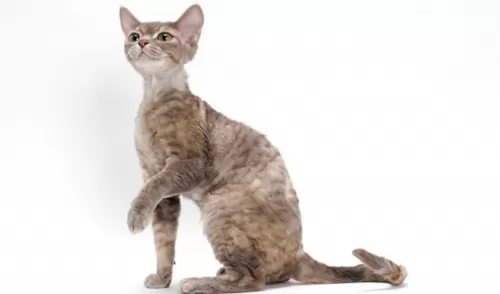 The Devon Rex is a cat known for its large ears and its curly, soft coat. It hails from England, emerging in the 1950s.
The Devon Rex is a cat known for its large ears and its curly, soft coat. It hails from England, emerging in the 1950s.
The cat is recognized by quite a few cat associations. The first of these cats was discovered by Beryl Cox in 1959 in Buckfastleigh, Devon. When the cat started appearing in cat shows in the UK, people starting becoming interested in owning these unusual cats.
 These are medium-sized cats which can become fairly large. They can weigh up to 4, 5 or 6kg. They are fairly heavily boned with a broad face and ears that are widely spaced.
These are medium-sized cats which can become fairly large. They can weigh up to 4, 5 or 6kg. They are fairly heavily boned with a broad face and ears that are widely spaced.
The round eyes are deep blue. The cat’s fur is medium-long and should be silky to the touch with no undercoat. Ther cat is a moderate shedder.
The base color is whitish to cream, but the kittens are always born white. Coat color, whether red, cream, or chocolate is always pointed and the cat always has the white paws.
The Birman isn’t as outgoing as some of the other cat breeds and its a quiet, docile intelligent cat that attaches itself to one particular family member. They can actually become jealous of their human companion and demand their attention.
These friendly cats are wonderful choices for families with children and dogs. They are calm and affectionate, and softly spoken, quietly letting you know when it’s dinner time and enjoying just being around his human family.
He is able to get along well with kids and other pets in the home. He can become quite playful too and because he is so intelligent, you can buy him some toys that require him to think.
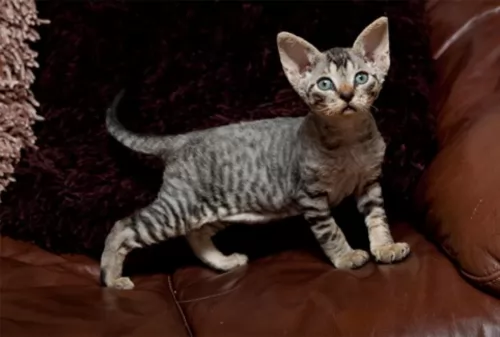 Known for its slender, light build, and weighing roughly between 2 and 4kg, the medium-sized Devon Rex has large, rounded ears. It is the large, rounded ears, set low on the sides of the broad head that make it slightly gremlin-like in appearance.
Known for its slender, light build, and weighing roughly between 2 and 4kg, the medium-sized Devon Rex has large, rounded ears. It is the large, rounded ears, set low on the sides of the broad head that make it slightly gremlin-like in appearance.
Their eyes are also large, and their noses are slightly upturned. It’s short, curly coat is another unusual feature and comes in many colors and patterns. The eyes can be blue, yellow, copper or he can be odd-eyed.
Your Devon Rex is quite a naughty cat, enjoying getting up to all kinds of mischief. Energetic, they love leaping up high onto perches so you’ll often find your Devon Rex in odd spots, more so if it's a spot in the sun as he loves warmth. It is why it is important to buy a cat tree for this cat.
It’s a loving, loyal cat and it will attach itself to one member of the family and then they are capable of pouring out the love and affection on this particular person. They’re also playful cats, as well as being intelligent.
He can learn a few tricks and can also be trained to walk on a leash. This is an active, energetic breed and will provide his human family with hours of amusing entertainment.
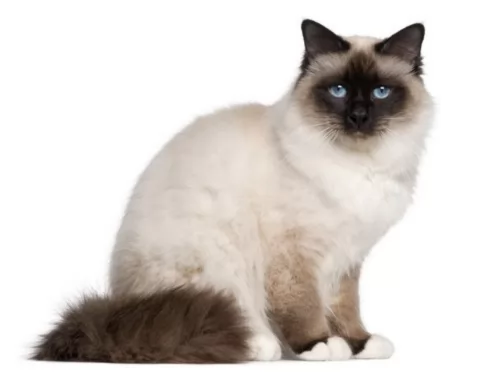 The Birman cat has to be one of the most beautiful cats there are, but the cat isn’t only a beautiful cat, it has wonderful characteristics as well.
The Birman cat has to be one of the most beautiful cats there are, but the cat isn’t only a beautiful cat, it has wonderful characteristics as well.
It is a loving, affectionate cat with his human family, loving to spend time around them. Playful and healthy, when you bring this most wonderful cat into your home, it will be as though an angel has come to stay.
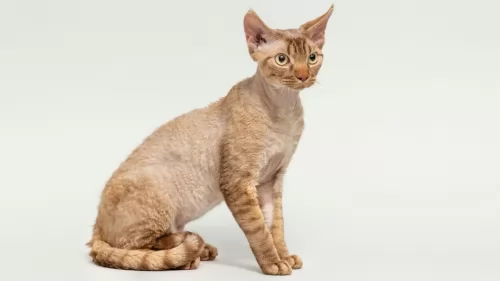 Your Devon Rex is a social cat and is happy to be found on your lap. He doesn’t take kindly to being left on his own though. He isn’t a suitable fit for someone who works all day.
Your Devon Rex is a social cat and is happy to be found on your lap. He doesn’t take kindly to being left on his own though. He isn’t a suitable fit for someone who works all day.
If you love animals, then maybe another companion animal would be a good idea as he is an amicable cat and gets on well with other animals.
When you spend time with your cat, make sure it is a special time, full of treats and stimulating play as he will learn to even fetch a small ball.
Just give him lots of attention and he’ll be your provider of companionship and entertainment.
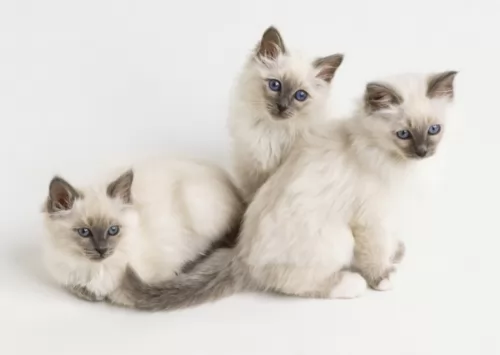 With good health your Birman can reach up to 13 years of age. With the Birman, the most serious illness is feline hypertrophic cardiomyopathy which also happens to be the most common heart disease in cats.
With good health your Birman can reach up to 13 years of age. With the Birman, the most serious illness is feline hypertrophic cardiomyopathy which also happens to be the most common heart disease in cats.
It’s a progressive disease and can result in heart failure. The cats are also at risk of developing feline infectious peritonitis.
Also, because this is a larger cat and a stocky kind of breed, it can easily put on weight and then become overweight. Strict attention will need to be given to diet as well as daily exercise.
Also, look out for Corneal dermoid - skin and hair on the surface of the cornea in one eye or in both. Luckily this is an eye problem that can be surgically corrected.
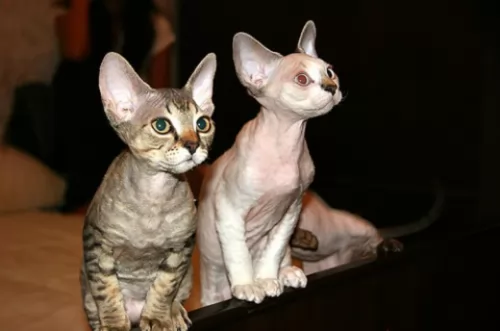 This particular cat isn’t known for any extreme health issues but even so, there are some health problems that are important to know about -
This particular cat isn’t known for any extreme health issues but even so, there are some health problems that are important to know about -
This is where the patella or knee cap moves out of its usual spot. It can occur because of a number of reasons such as an injury or congenital malformation. The vet will want x-rays because sometimes hip dysplasia is also present.
This is an inherited condition seen in both male and female cats and usually in young kittens. The cat has an odd gait with a head that bobs along as is tries to walk. The cat has tremors and also has difficulty with swallowing. With a visit to the vet and special care, your cat can do well.
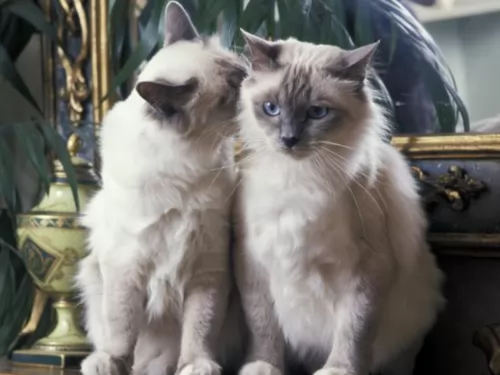 The Birman has a silky coat that sheds moderately so you want to give him a gentle brush once or twice a week to keep the coat of his soft and silky.
The Birman has a silky coat that sheds moderately so you want to give him a gentle brush once or twice a week to keep the coat of his soft and silky.
The Birman has a full topcoat, with no undercoat which means that you won’t have the coat matting or tangling.
He’ll need his nails trimmed and his teeth checked regularly. Your vet or professional groomers can do this for you and clean his teeth and check that there are no bad teeth making your pet sick.
The Birman cat has access to some great commercial cat food as there are some seriously good quality ones.
Many cat lovers choose cat foods that are AAFCO (Association of American Feed Control Officials) approved. It at least provides minimum standards for pet foods.
For your Birman you want to avoid artificial flavors and preservatives. Choose quality foods high in meat protein. As a carnivore, a cat has a huge need for meat protein. Get to know your pet food labels and choose foods with added taurine and vitamin A.
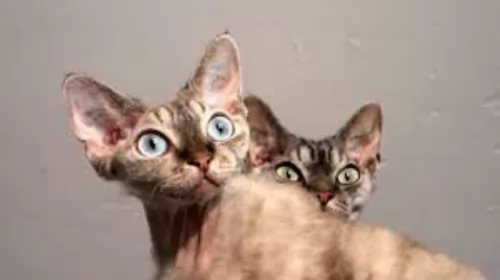 The Devon rex cat breed is known for its unusual looks with its wavy fur, large ears and large eyes. It is considered a rare breed and you want to make sure that you take proper care of him.
The Devon rex cat breed is known for its unusual looks with its wavy fur, large ears and large eyes. It is considered a rare breed and you want to make sure that you take proper care of him.
Owners of the Devon Rex know that these cats love their food and it has to be top quality food to enhance good feline health.
Cats are carnivores, ad this actually means that they should stick to a meat diet. Any food you buy your cat should be mainly meat. Look at the packaging of the commercially manufactured cat foods you want to buy, and make sure that the first few ingredients are some sort of meat.
Remember that any uncertainty with feeding your cat, you can chat with your vet.
Keep the inside of your cat’s ear free of an accumulation of wax and dirt as well as infection. If you don’t like the idea of probing in your cat’s ears, be in contact with your vet or a reputable, professional cat groomer.
Trim the cat’s nails.
Check inside his mouth for bad teeth as this could be causing him pain.
Clean your cat’s litter box every single day and also replace the grit regularly.
Get your cat veterinary care as soon as he shows signs of illness. Certainly, make sure all his vaccines and deworming are up to date.